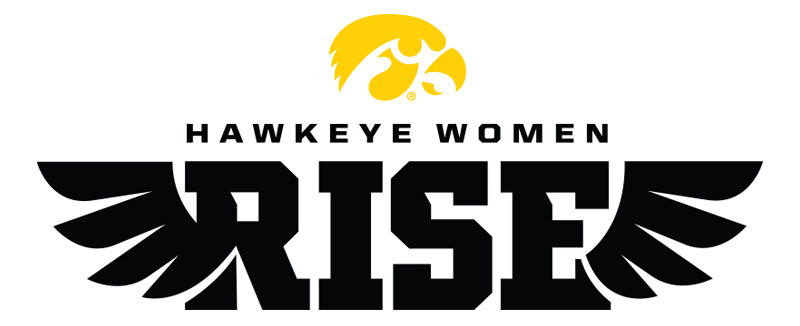‘For Her’: Iowa Sets Standard for Women’s Wrestling
Wrestling can be a solitary sport. Beyond practice, student-athletes devote countless, lonely hours to training and perfecting technique. When they step inside the circle and lock arms with an opponent, victory or defeat rests squarely on their shoulders.
Yet it was hardly an individual journey this past season for the 26 members of the inaugural Iowa women’s wrestling team. They formed bonds with teammates from around the nation, won over a new fan base, and competed for something greater than personal accolades. That’s why the Hawkeyes adopted “For Her” as the rallying cry for their debut campaign—they were wrestling not just for themselves, but for the women who came before them and those who will follow.
“It’s a good reminder of how to represent themselves, lead with gratitude, and know there’s a bigger ‘why’ than themselves,” says Iowa coach Clarissa Chun of the mantra.
The first women’s wrestling team assembled by a Power Five conference school, Iowa made an indelible mark on the sport this past winter. The Hawkeyes drew record crowds and set a new standard for the growing sport. They won their first National Duals championship and finished undefeated in dual meets. And above all, they proved that major college women’s wrestling is here to stay.
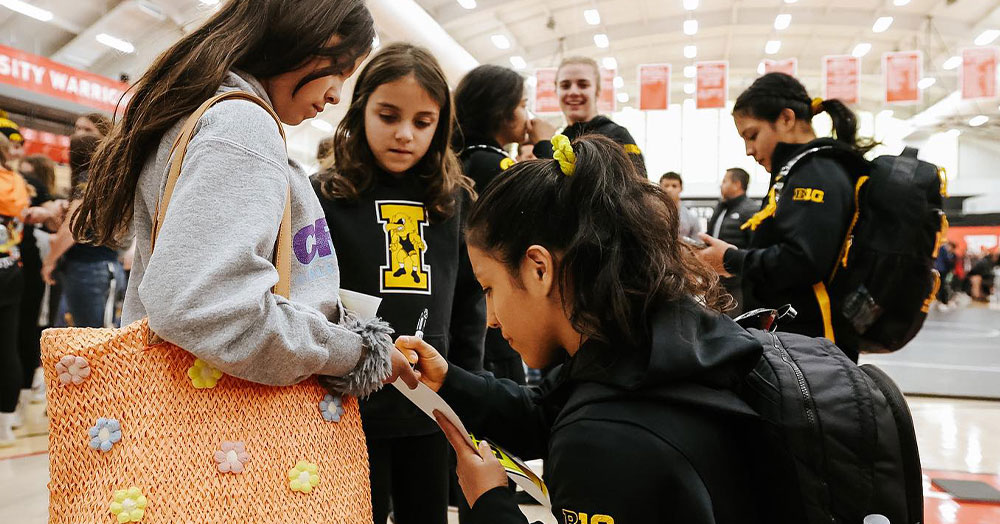 PHOTO: JEROD RINGWALD/HAWKYESPORTS.COM
Iowa wrestler Emilie Gonzalez signs autographs during the team’s first meet this past season at East Stroudsburg University of Pennsylvania.
PHOTO: JEROD RINGWALD/HAWKYESPORTS.COM
Iowa wrestler Emilie Gonzalez signs autographs during the team’s first meet this past season at East Stroudsburg University of Pennsylvania.
A Greater Purpose
Shortly after arriving on campus as the first crop of Hawkeye recruits, the new teammates sat down together to watch a documentary about Christine Grant (70BA, 74PhD), the late UI women’s athletic director and a revered figure in the national Title IX movement. The student-athletes saw the parallels in Grant’s struggle decades ago for equity in women’s athletics with what they face today in their male-dominated sport.
“We were just so moved and enlightened by her story and the upbringing of women’s athletics in general,” Hawkeye sophomore Sterling Dias says of the UI-produced film, Unshakeable Belief: The Dr. Christine Grant Story. “We knew we wanted to dedicate something special for her and everyone else who we have been impacted by—and the little girls watching us in the stands.”
Inspired by pioneers like Grant and embracing their roles as leaders for the next generation of wrestlers, Dias and her teammates adopted “For Her” as their ethos. They break their huddles with the chant after every practice, and several Hawkeyes went together to get the phrase tattooed on their arms before the start of the season.
“There are so many people that paved the way for us, and there are so many more to come,” says Iowa senior Felicity Taylor, who wrestles with “For Her” inked on forearm.
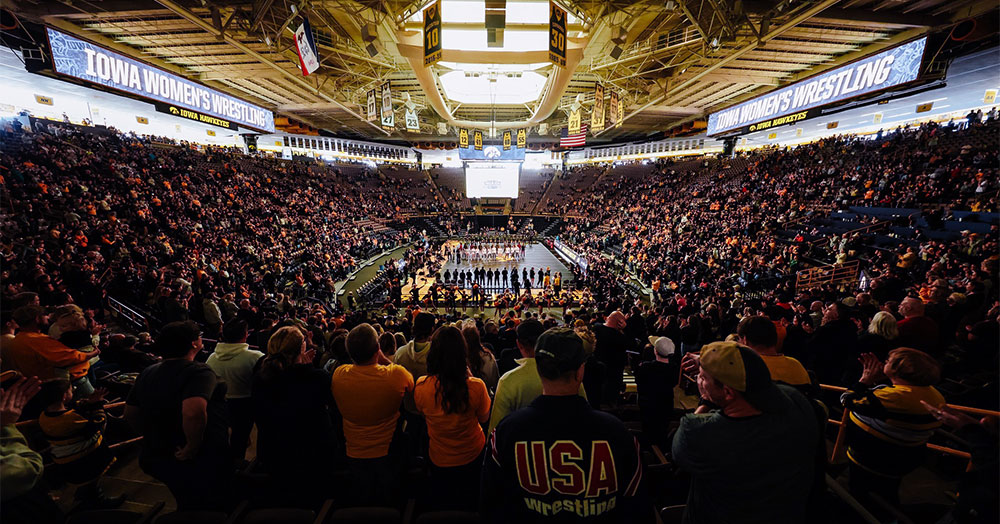 PHOTO: HAWKYESPORTS.COM
Fans set a new national attendance record for women’s wrestling this past November at Carver-Hawkeye Arena.
PHOTO: HAWKYESPORTS.COM
Fans set a new national attendance record for women’s wrestling this past November at Carver-Hawkeye Arena.
Record-Setting Debut
The Hawkeyes ushered in a new era when they hosted the Trailblazer Duals in November at Carver-Hawkeye Arena. Iowa’s first home meet drew 8,207 fans—a new women’s college wrestling attendance record. The spirited crowd fueled a dominant Hawkeye performance. Iowa grapplers went 32-1 on the day to record team victories over Presbyterian College, Lindenwood University, and Sacred Heart University.
“Our women know how to bring a lot of energy,” Chun said after the meet, which featured the nation’s first four Division I schools to sponsor women’s wrestling. “They know how to have fun, keep it light, but they also know how to flip that switch and get to business.”
The Hawkeyes also wrestled in front of a hometown crowd in December at the Soldier Salute at Xtream Arena in Coralville, where they captured a team championship and five individual titles, and at a double dual in January at Carver, where they collected team wins over Missouri Valley College and Life University.
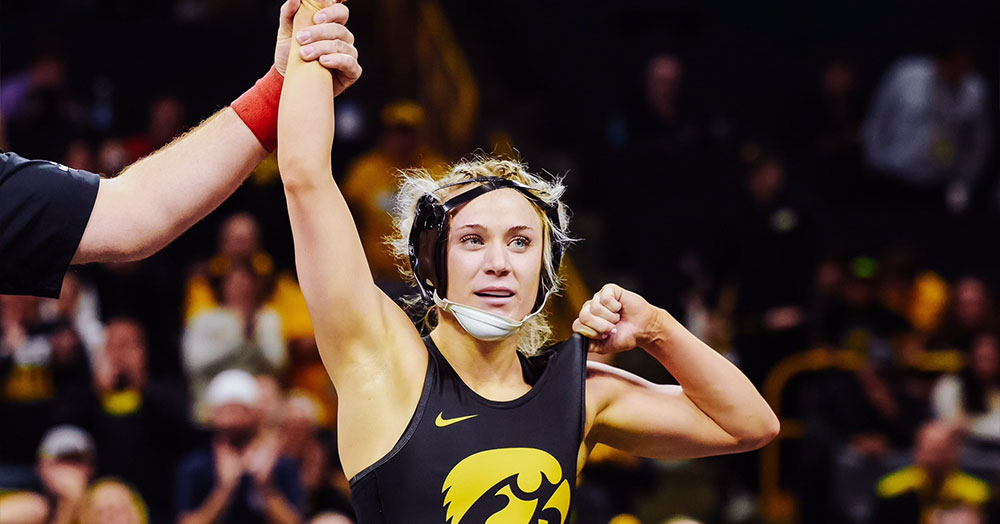 PHOTO: JEROD RINGWALD/HAWKYESPORTS.COM
Senior Felicity Taylor is one of three wrestlers from Iowa on the Hawkeyes’ roster.
PHOTO: JEROD RINGWALD/HAWKYESPORTS.COM
Senior Felicity Taylor is one of three wrestlers from Iowa on the Hawkeyes’ roster.
Homegrown Talent
The state’s passion for wrestling is reflected on the Hawkeyes’ roster. Three Iowa natives suited up for the black and gold this past season: freshman Lilly Luft of Charles City, sophomore Ella Schmit of Bettendorf, and fifth-year senior Felicity Taylor of Spillville.
According to the National Wrestling Coaches Association, more than 50,000 high school girls currently compete in wrestling in the U.S.—up from 804 in 1994. Here in the Hawkeye State, where the Iowa Girls High School Athletic Union officially sanctioned the sport in 2022, the popularity has soared. In 2023, Iowa had 2,379 high school girls involved in wrestling, more than double the previous year, according to FloWrestling.
Taylor, who grew up in a family of Hawkeye fans, previously won a national title for Division II power McKendree University in Lebanon, Illinois, before transferring to the UI. Taylor has broken barriers since she started wrestling as a ninth grader. At South Winneshiek High School in northeast Iowa, she became the first female wrestler in state history to earn 100 wins while competing against boys.
“Being able to put on the Tigerhawk singlet and compete in front of thousands of fans is honestly my favorite memory being here so far,” says Taylor. “Coming out of the tunnel and taking in everything that was going on—I was super emotional, just really taking in the moment. I’m just so thankful that I have the opportunity to compete here as a Hawkeye.”
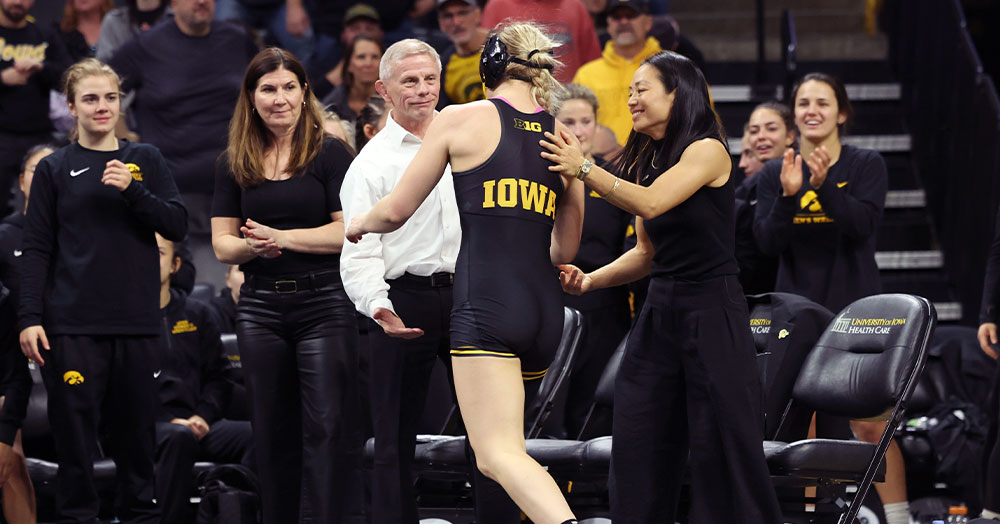 PHOTO: JEROD RINGWALD/HAWKYESPORTS.COM
Iowa assistant coach Tonya Verbeek (second from left), associate head coach Gary Mayabb, and head coach Clarissa Chun congratulate wrestler Marlynne Deede after a match in November at the Trailblazers Duals at Carver-Hawkeye Arena.
PHOTO: JEROD RINGWALD/HAWKYESPORTS.COM
Iowa assistant coach Tonya Verbeek (second from left), associate head coach Gary Mayabb, and head coach Clarissa Chun congratulate wrestler Marlynne Deede after a match in November at the Trailblazers Duals at Carver-Hawkeye Arena.
In Their Corner
Some of wrestling’s top minds are the architects behind the Hawkeyes’ newest scholarship sport. Chun, hired in fall 2021, was a World champion and Olympian who previously served as an assistant coach on the USA Wrestling women’s team. She lured two colleagues to Iowa City—former USA Wrestling Greco-Roman programs manager Gary Mayabb, Iowa’s associate head coach, and former Canadian National Team coach Tonya Verbeek, who serves as Iowa’s assistant coach.
That coaching cachet—along with Iowa’s proud history in men’s wrestling—has attracted many of the nation’s most decorated recruits and transfers to Iowa City. Dias, a Las Vegas native, first met Chun years ago at a national event, and she grew up idolizing the 2012 Olympic bronze medalist.
“Once I heard the program was starting and I realized that Coach Chun was going to be the coach, I was really excited,” says Dias, who was a two-time Cadet World medalist before signing with the Hawkeyes. “I wanted to be a part of this environment and coached under the person who I’ve been idolizing my entire life.”
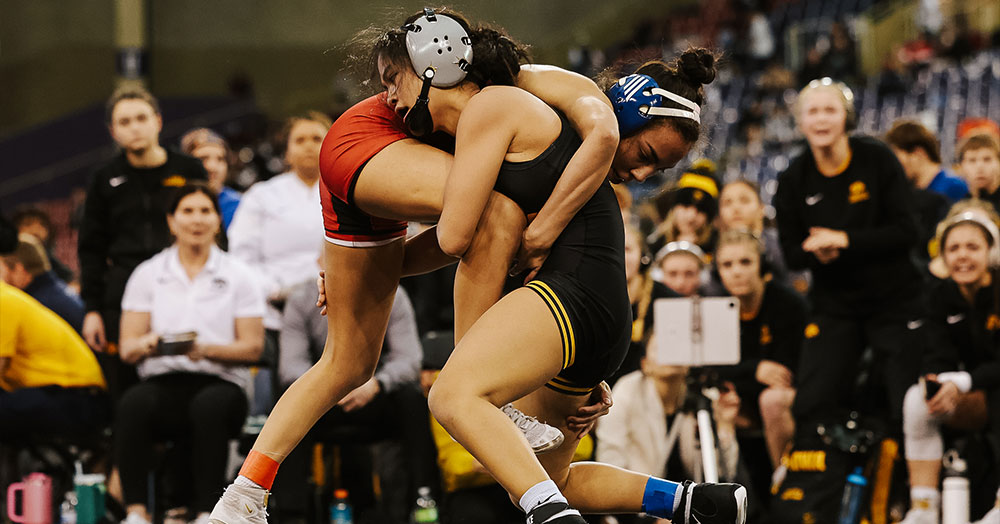 PHOTO: JEROD RINGWALD/HAWKYESPORTS.COM
Hawkeye 101-pounder Sterling Dias battles in January at the National Duals in Cedar Falls, where Iowa won the team championship.
PHOTO: JEROD RINGWALD/HAWKYESPORTS.COM
Hawkeye 101-pounder Sterling Dias battles in January at the National Duals in Cedar Falls, where Iowa won the team championship.
New Team, New Rules
While Iowa fans are well-acquainted with the ins and outs of collegiate men’s wrestling, which follows folkstyle rules and scoring, women’s wrestling uses a freestyle format. Freestyle matches are often quicker and produce more points. Matches feature two, three-minute periods with a 30-second break in between, and the scoring system rewards dynamic moves, technical superiority, and quick actions, whereas folkstyle emphasizes control, positioning, and riding time. Freestyle is also the format used for international women’s wrestling competitions, including the Olympics.
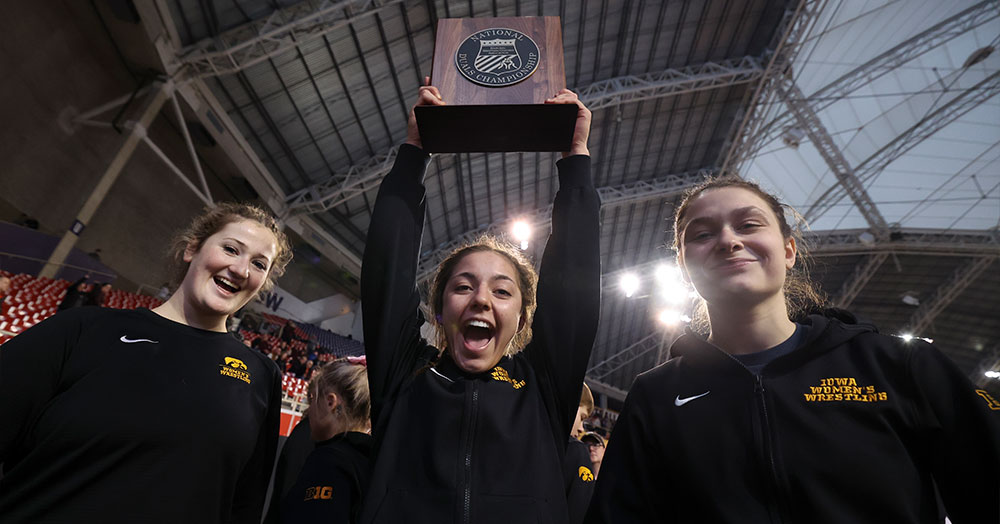 PHOTO: JEROD RINGWALD/HAWKYESPORTS.COM
Iowa wrestlers, from left, Alivia White, Lilly Luft, and Emily Frost celebrate the National Duals championship in January in Cedar Falls.
PHOTO: JEROD RINGWALD/HAWKYESPORTS.COM
Iowa wrestlers, from left, Alivia White, Lilly Luft, and Emily Frost celebrate the National Duals championship in January in Cedar Falls.
National Duals Champions
January’s National Duals featured 36 mats of action at the UNI-Dome in Cedar Falls. But on the final day, all eyes were on the women’s championship circle, where Iowa squared off against North Central College of Naperville, Illinois. In a thriller, the second-seeded Hawkeyes defeated their top-seeded adversaries 21-20 to earn their first National Duals women’s crown.
Hawkeye star Kylie Welker gave Iowa the late lead over North Central with a decision at 170 pounds, then 191-pounder Jaycee Foeller secured the team title by collecting a passivity point in her bout. The midseason championship put the nation on notice: Iowa, which had vaulted to the top of the national polls, was the new standard bearer for women’s wrestling.
“It was definitely a surreal moment,” says Dias, a 101-pound sophomore who recorded three pins and a technical fall at the two-day tournament. “It wasn’t anything like I’ve ever experienced on a team. We’re trying to start a movement with women’s wrestling, and we got to really showcase who we are and what we represent at the University of Iowa.”
Later in January, the Hawkeyes closed out a perfect 16-0 dual meet season with a road win over the University of Sioux Falls in South Dakota. With the 39-7 victory, Iowa outscored opponents in dual competitions 593-108.
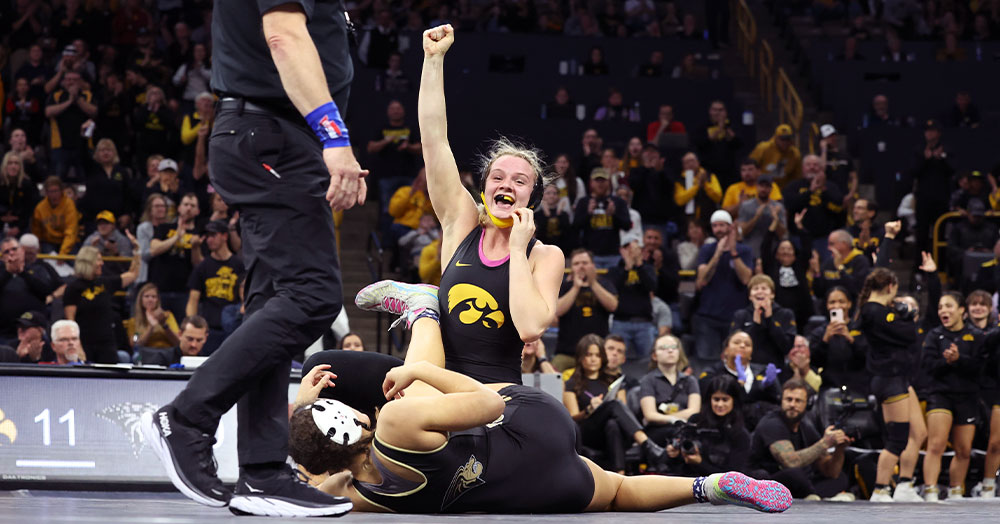 PHOTO: JEROD RINGWALD/HAWKYESPORTS.COM
Iowa’s Marlynne Deede pins Lindenwood’s Rebecca Strong in November during the Trailblazers Duals at Carver-Hawkeye Arena.
PHOTO: JEROD RINGWALD/HAWKYESPORTS.COM
Iowa’s Marlynne Deede pins Lindenwood’s Rebecca Strong in November during the Trailblazers Duals at Carver-Hawkeye Arena.
An Emerging NCAA Sport
Iowa’s ultimate goal this season is to capture gold at the National Collegiate Women’s Wrestling Championship. The event, hosted by a coalition of national organizations, is March 8-9 at the Alliant Energy Powerhouse in Cedar Rapids.
Although the NCAA doesn’t yet sponsor a women’s wrestling championship, the association released its latest sports sponsorship report this past October, stating that women’s wrestling—categorized as an “emerging sport”—is on track to soon gain NCAA championship status. According to the NCAA, 51 schools sponsored women’s wrestling in 2022-23, which is 12 more than the previous year. This past season, Iowa became just the fourth Division I program and the first team from a Power Five conference. Chun is hopeful that other major conference schools soon follow suit and Iowa can serve as a model for new women’s programs.
The NCAA Committee on Women’s Athletics, which oversees the Emerging Sports for Women program, recently announced plans to recommend the addition of a national collegiate women’s wrestling championship. That would put women’s wrestling on track to host its first NCAA championships in winter 2026.
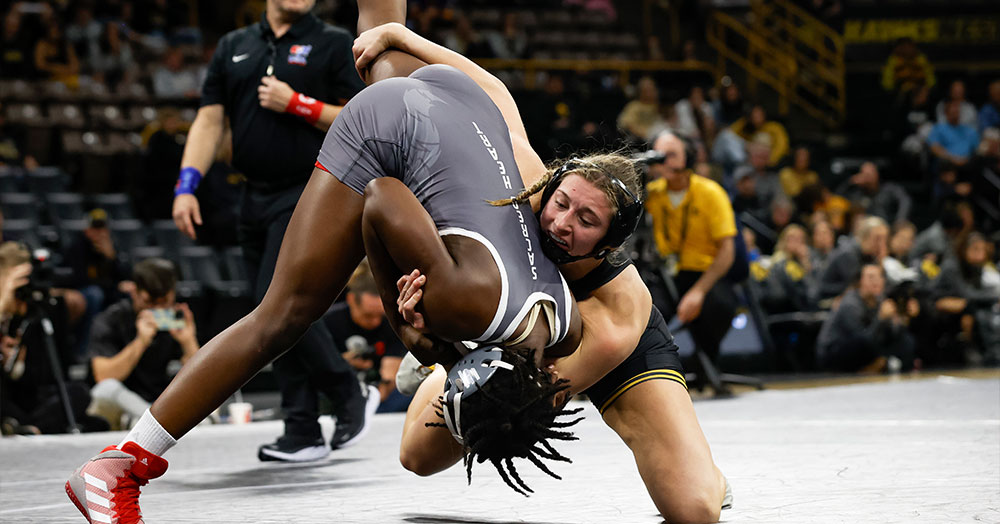 PHOTO: ANNA MOORE/HAWKYESPORTS.COM
Iowa’s Kylie Welker, pictured here during the Trailblazer Duals earlier this season in Iowa City, will compete in the Olympic Team Trials in April in State College, Pennsylvania.
PHOTO: ANNA MOORE/HAWKYESPORTS.COM
Iowa’s Kylie Welker, pictured here during the Trailblazer Duals earlier this season in Iowa City, will compete in the Olympic Team Trials in April in State College, Pennsylvania.
Olympic Hopefuls
At least three Hawkeyes will compete this spring for a chance to represent the U.S. in the 2024 Summer Olympics. Senior Marlynne Deede finished in second place and freshman Rose Cassioppi took fifth at the Senior Nationals this past December to qualify for the Olympic Team Trials. Welker, a 2021 Junior World Champion and runner-up at the previous Olympic Team Trials, had already qualified. The Iowa trio—who could be joined by other Hawkeyes should they win a collegiate national title this month—will wrestle for a spot on Team USA April 19-20 in State College, Pennsylvania.
International competition has been a part of Iowa wrestling’s DNA for decades. The newly formed Iowa Women’s Wrestling Club joins the men’s Hawkeye Wrestling Club as a supporting program for athletes with World and Olympic ambitions.
Welker is considered Iowa’s top contender for the Summer Games in Paris. The Franksville, Wisconsin, native who became Chun’s first recruit when she committed in early 2022, has dreamed of being an Olympian since she was in grade school. After leading Iowa to the National Duals title in January, Welker traveled to Croatia with Team USA to compete against some of the world’s top wrestlers in an Olympic year tune-up. “2024 is a year that has been glued into my mind since I was 7 years old,” Welker wrote on Instagram. “And it’s finally here. Time to continue to chase my goals.”
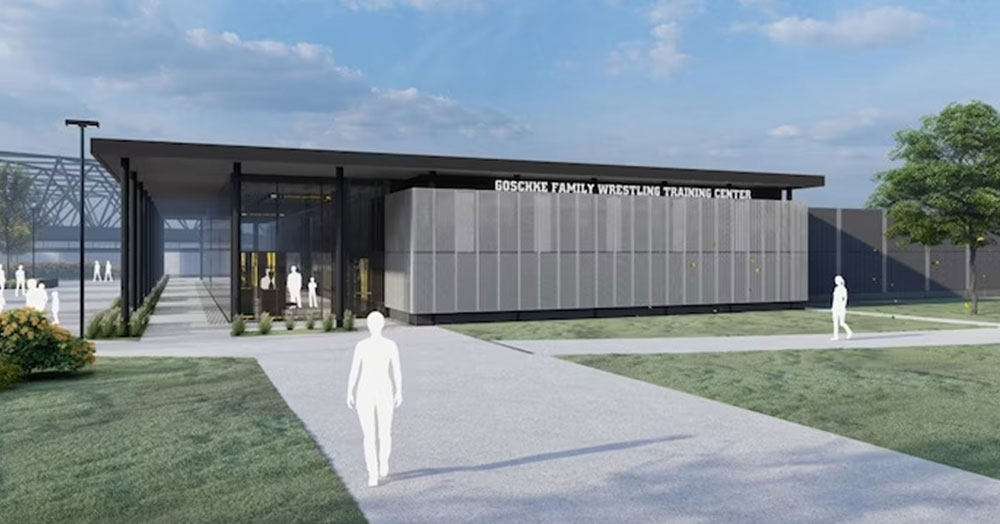 ILLUSTRATION: HAWKYESPORTS.COM
An architect’s rendering of the Goschke Family Wrestling Training Center, which is set to open this spring.
ILLUSTRATION: HAWKYESPORTS.COM
An architect’s rendering of the Goschke Family Wrestling Training Center, which is set to open this spring.
New Hawks’ Nest
Another milestone for Hawkeye wrestling arrives this spring: the opening of the Goschke Family Wrestling Training Center. The culmination of the yearslong Carver Circle campaign, the $31-million, donor-funded facility is the new practice home for the men’s and women’s teams. The facility connects to Carver-Hawkeye Arena via an underground tunnel and houses a 13,000-square-foot wrestling room, strength and conditioning areas, locker rooms, student-athlete lounge, training and therapy rooms, and operations offices. The Hall of Champions, which is open to the public, showcases Iowa wrestling’s storied history.
“It’s all the hard work and efforts of the men’s wrestling program, the University of Iowa, and every donor that’s given to build an amazing, world-class facility,” Chun says. “I’ve not been in a bigger facility in my wrestling career and lifetime as an athlete or coach, so it’s going to be the best.”

